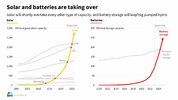David_Cary
Active Member
Total solar advocate here but....
Solar panel output goes down with high heat. Is this more than a NG plant output is effected? I have to think so but I don't have data.
And this solar panel output decrease doesn't take a major heat wave - it happens pretty early.
Then, there is the expected life of both solar and battery with high heat (or lower efficiency for a battery that requires more active cooling).
So I have to think that areas with high heat are going to have more issues as solar penetrance gets higher. And eventually, more areas become "high heat" so the problem worsens. NV would seem to be the first to see these issues.
As far as the US consumer - is there really anyone who doesn't realize that we are a big part of the problem? I mean is this really a discussion that we need to have? But - I would also argue that most of this behavior is human nature. We just allow it in ways that other countries don't. And we are wealthy. So wealth + freedom + human nature is a dangerous equation from an earth sustainability viewpoint. I do think there are peculiar American forces at work but it isn't like Europeans weren't buying more SUVs over time - until very recently I imagine. And the short haul flights in Europe are way up.
Solar panel output goes down with high heat. Is this more than a NG plant output is effected? I have to think so but I don't have data.
And this solar panel output decrease doesn't take a major heat wave - it happens pretty early.
Then, there is the expected life of both solar and battery with high heat (or lower efficiency for a battery that requires more active cooling).
So I have to think that areas with high heat are going to have more issues as solar penetrance gets higher. And eventually, more areas become "high heat" so the problem worsens. NV would seem to be the first to see these issues.
As far as the US consumer - is there really anyone who doesn't realize that we are a big part of the problem? I mean is this really a discussion that we need to have? But - I would also argue that most of this behavior is human nature. We just allow it in ways that other countries don't. And we are wealthy. So wealth + freedom + human nature is a dangerous equation from an earth sustainability viewpoint. I do think there are peculiar American forces at work but it isn't like Europeans weren't buying more SUVs over time - until very recently I imagine. And the short haul flights in Europe are way up.





